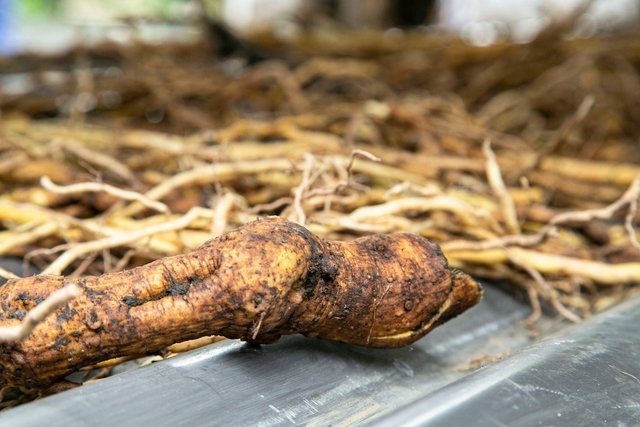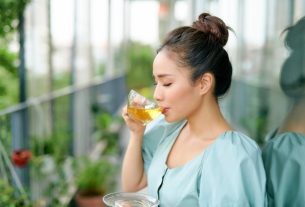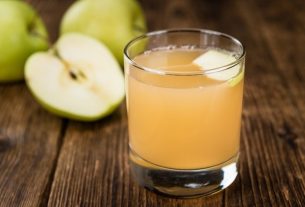Kava-kava, or kawa-kawa, is a plant widely used in traditional medicine to treat cases of anxiety, agitation or tension. Its scientific name is Piper methysticum and can be found in health food stores, online stores and even in some supermarkets.
This plant has some very important active substances, known as kavalactones, which, according to some studies, appear to act in a very similar way to some anxiolytic medications, regulating the action of the GABA neurotransmitter in the brain.
Therefore, Kava-kava can be an excellent natural treatment option for cases of anxiety and agitation, before opting to use drugs. However, for it to be used correctly and in safe doses, its use must be guided by a naturopath, herbalist, nutritionist or other health professional specialized in the use of medicinal plants.

What is it for
Kava Kava is indicated for:
1. Decrease anxiety
Kava Kava is rich in kavalactones, which are natural substances that regulate the action of the neurotransmitter GABA in the brain. Kava Kava has an action similar to benzodiazepines, which are one of the main types of medicine used in the medical treatment of anxiety.
In this way, Kava Kava can be used to help reduce anxiety and tension, and improve relaxation, due to its calming, relaxing and anxiolytic properties.
2. Relieve PMS symptoms
Kava Kava can help alleviate PMS symptoms, such as irritability and anxiety, due to the kavalactones in its composition with calming and anxiolytic effects.
3. Combat insomnia
Due to the kavalactones with calming and muscle relaxing effects in its composition, Kava Kava can help combat insomnia and improve sleep quality.
Furthermore, by having anxiolytic effects, Kava Kava helps reduce anxiety and stress, which are common causes of insomnia.
4. Reduce the risk of neurodegenerative diseases
The kavalactones in Kava Kava have neuroprotective properties, which help reduce the risk of neurodegenerative diseases such as Alzheimer’s, Parkinson’s or stroke.
However, more studies are still needed to confirm these benefits.
5. Help in the treatment of seizures
Some studies indicate that Kava-kava can be used in cases of seizures, since one of its kavalactones, kavain, has an antagonistic action on sodium channels, which ends up stabilizing the electrical action of the neuron.
However, the use of Kava Kava should not replace treatment with anticonvulsant medication prescribed by a neurologist.
6. Reduce pain
Due to its calming and muscle-relaxing properties, this plant can be used to combat severe headaches such as headaches and migraines, as well as muscle pain due to injuries, contractures and sprains.
How to use Kava-kava
The used part of Kava-kava is its rhizomes, where the highest concentration of its active substances is found. There are several ways to use this plant:
- Supplement (capsules): this is the most effective way, as it uses a more concentrated extract of the plant’s active substances. To use in the form of a supplement, the ideal is to consult a herbalist, however, the recommended generic dose is generally 60 to 120 mg per day, in the case of extracts with 50 to 70% concentration of kavalactones;
- Tea: Kava-kava rhizomes can also be used to make tea, however, in this form of use it is not possible to know for sure the concentration of active substances. However, it is recommended that 1 tablespoon of Kava-kava rhizomes be boiled with 500 mL of water for 10 minutes. Then strain, let it cool and take it 2 to 3 times a day, or at times when you feel more anxious, for example.
Ideally, you should always consult a herbalist or a health professional specialized in medicinal plants, as their use, doses and treatment time may vary according to each person and their history.
Check out other natural options to control anxiety.
Possible side effects
The main side effect of using Kava-kava is the appearance of serious liver damage. However, the only studies carried out on this effect were carried out with people who also had other habits that could affect liver function. Therefore, although the true effect of Kava on the liver is not yet known, it is recommended not to exceed a dose of 120 mg per day.
Kava-kava contraindications
Kava-kava is contraindicated for pregnant and breastfeeding women as there are no studies on its safety during these stages of life. Furthermore, it should be avoided by those who have liver disease or those who are taking antidepressants, at least without advice from a healthcare professional.
Bibliography
- GABRIEL RENÉ ROMERO AUTONOMOUS UNIVERSITY FACULTY OF PHARMACEUTICAL AND BIIOCHEMISTRY SCIENCES. Coffee coffee. 2017. Available at: <https://pt.scribd.com/document/363401278/Monografia-Planta-Kava#>. Accessed on Aug 3, 2023
- SARRIS, J.; et al. Kava for generalised anxiety disorder: A 16-week double-blind, randomised, placebo-controlled study. Aust N Z J Psychiatry. 54. 3; 288-297, 2020
- WANG, Y.; et al. Biological Activity, Hepatotoxicity, and Structure-Activity Relationship of Kavalactones and Flavokavins, the Two Main Bioactive Components in Kava (Piper methysticum). Evid Based Complement Alternat Med. 2021. 6851798, 2021
- PRINSLOO, D.; et al. Monoamine Oxidase Inhibition by Kavalactones from Kava (Piper Methysticum). Plant Med. 85. 14-15; 1136-1142, 2019
- SARRIS, J.; et al. Kava in the treatment of generalized anxiety disorder: a double-blind, randomized, placebo-controlled study. J Clin Psychopharmacol. 33. 5; 643-8, 2013
- TZENG, YM.; et al. Neuroprotective properties of kavalactones. Neural Regen Res. 10. 6; 875–877, 2015
- BARBOSA, Diomara Resende et al.. Kava-kava (Piper methysticum): a general review. ITPAC Scientific Magazine. Vol.6. 2013
- RACHEL, David. Integrative Medicine. 4.ed. Elsevier, 2018. 49.
- GRUNWALD, JORG; JANICKE, CHRISTOF. The green pharmacy. Spain: Editora Everest, 2009. 280-281.

Sign up for our newsletter and stay up to date with exclusive news
that can transform your routine!
Warning: Undefined array key "title" in /home/storelat/public_html/wp-content/plugins/link-whisper-premium/templates/frontend/related-posts.php on line 12
Warning: Undefined array key "title_tag" in /home/storelat/public_html/wp-content/plugins/link-whisper-premium/templates/frontend/related-posts.php on line 13



